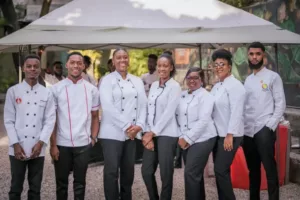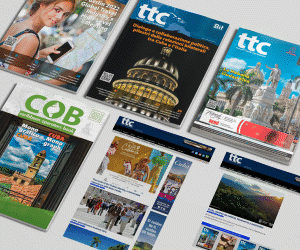Caribbean cuisine transcends borders thanks to UNESCO’s Transcultura programme

For Weizman Seide, no dish embodies the identity of the Caribbean like Haiti’s Jomou soup. Once forbidden to enslaved people, it became a symbol of freedom after independence and was inscribed on UNESCO’s Intangible Cultural Heritage list in 2021. ‘Jomou soup reminds us of our past marked by enslavement, but also our collective strength to achieve freedom,’ says Weizman, who sees gastronomy as both a form of expression and a means of building community.
Raised in the kitchens of his mother, grandmother and aunts, who cooked for church gatherings and celebrations, he began learning the bakery trade with a relative. After completing training, he launched his own company, La Contrée du Chef, which offers courses, catering and show cooking for events, with a focus on preserving and promoting Haitian cuisine.
Transcultura: a springboard for success
In 2024, Weizman took part in a business incubator organized by the programme Transcultura: Integrating Cuba, the Caribbean and the European Union through culture and creativity, implemented by UNESCO and funded by the European Union. The programme supports young Caribbean creatives by helping them professionalize and develop their careers.
For the young chef, this was an opportunity to develop a new initiative: the Caribbean Culinary Community, a network of chefs and food-lovers celebrating regional food heritage. Following the incubator, which focused on regional integration, his project was one of six selected from 470 candidates to receive funding from the Caribbean Culture Fund under the ‘Caribbean collaboration’ category.
Transcultura allowed me to acquire key skills and connect with international networks to transform my ideas into concrete initiatives. My participation in this incubator was fundamental to accessing these funds, as I learned to better structure and present my project. Weizman Seide
Traditional cuisine, modern-day potential
With the Caribbean Culinary Community, Weizman hosts trainings, festivals, and chef meetups, and is developing a regional recipe book. His goal is to preserve culinary traditions while showcasing their modern relevance—enabling Caribbean cuisine to be studied globally.
Just as it is possible to study the great cuisines of the world, my dream is that we can study Caribbean cuisine in a way that ensures the preservation and transmission of our traditions while exploring all its contemporary potential. Weizman Seide
At a time when the crisis in Haiti is severely affecting young people, Weizman is convinced that gastronomy offers exceptional opportunities. Not only does it create jobs across various sectors, from agriculture to fishing, but it also challenges negative stereotypes by presenting a richer image of Haiti. He believes that this, in turn, could boost cooperation and tourism – especially important in the Caribbean, where tourism can account for up to 50% of GDP.
I want Caribbean cuisine to continue telling our stories of struggle and joy, but above all, I want it to be a lever for economic development, cultural identity and inspiration for the youth of Haiti. Weizman Seide
Source: UNESCO

MORE NEWS














